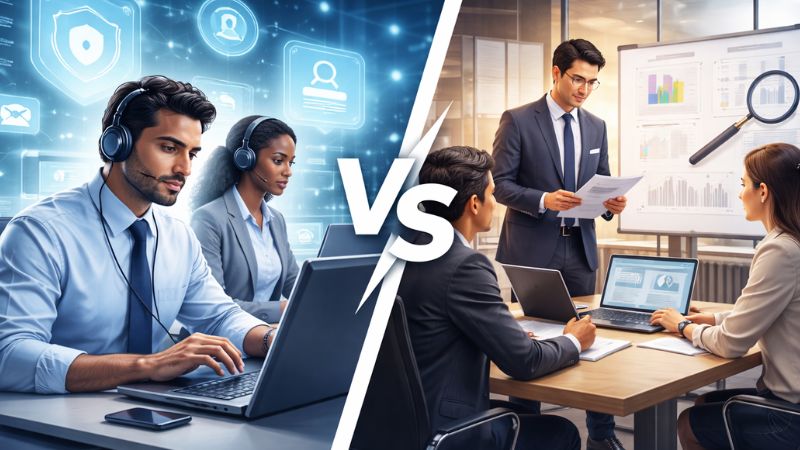When companies have an incident, a grievance or a complaint, initiating an internal investigation is the first step in addressing the situation. Meanwhile, when conducting workplace investigations in Singapore, companies are bound by legislative frameworks, internal policies and employment agreements, which often make compliance a challenging task.
Since a failure to comply with applicable requirements can lead to counterclaims and employees filing for damages, many companies consider the options of in-house vs. outsourced investigations. In this article, we review the existing requirements for the investigation process, outline common practices employed by the companies, and discuss the prospects of outsourcing workplace investigations in Singapore.
Key Takeaways
- Conducting a due inquiry or workplace investigation is a required step to address a complaint, grievance or misconduct.
- Companies conducting internal investigations need to comply with a number of legislative requirements and fulfil their other obligations foreseen by internal documents.
- Employers have the option of in-house vs outsourced investigations.
- Outsourcing workplace investigations in Singapore can help ensure compliance with regulatory requirements and reduce the risk of counterclaims for alleged violations.
Importance of Proper Workplace Investigations
Following an effective process for workplace investigations is important for a number of reasons. First of all, the companies have compliance requirements they must fulfil when they react to employee misconduct, harassment, grievances, or other incidents. As demonstrated in the often-cited case of Long Kim Wing v LTX Credence Singapore, the more the informality in conducting a workplace investigation, the greater is the risk that legal requirements are not met.
Secondly, conducting effective investigations allows companies to avoid bias and omissions, properly address the root causes, and restore workplace harmony. Finally, reacting to grievances, misconduct, and emerging compliance risks with effective investigations allows companies to go beyond mere compliance and demonstrate strong governance for all internal and external stakeholders.
Data Protection and Confidentiality in Investigations
In handling workplace investigations, employers are under various obligations to ensure the protection of personal data as well as the identities of persons involved in the investigation.
According to the Personal Data Protection Act (PDPA) of Singapore, companies can use personal data for workplace investigation without consent. Meanwhile, the law obliges organisations to impose restrictions on data recipients and disclosure, and introduce processes to implement such restrictions.
In workplace harassment cases, the Tripartite Guidelines by the Ministry of Manpower (MOM) require companies to ensure confidentiality of the identities of the alleged harasser, the informant, and the affected persons unless disclosure is required for safety reasons. The same guidelines govern whistleblowing policies, protecting employees from retaliation and ensuring confidentiality.
In-House Investigations vs Third-Party Hotlines and External Investigators
When companies have a case of alleged workplace misconduct or a complaint filed through internal channels or third-party hotlines, they start an investigation. When conducting workplace investigations in Singapore, in many cases, organisations can appoint an investigator from management, HR, or the legal team. However, in certain scenarios, appointing an external investigator or hiring a corporate investigation lawyer may be advisable.
In Singapore, the law does not set minimum qualifications or criteria for someone to handle employee grievances or workplace investigations. At the same time, such a person should:
- be authorised by the company,
- provide for independent and fair investigation,
- hold a position that excludes bias or potential conflict of interest.
When the incident involves a sensitive matter or an alleged misconduct by a senior management, ensuring an unbiased and impartial investigation can become increasingly challenging. In these cases, companies can consider outsourcing their workplace investigations in Singapore by hiring an external corporate employment lawyer who can ensure compliance, provide for a formal process, and handle disputes and claims.
Legal and Compliance Considerations for Employers
In many cases, workplace investigations in Singapore are regulated by the company’s internal policies, employee handbooks, as well as terms of employment in service contracts. In turn, these guidelines and processes for workplace investigations should be aligned with the existing regulatory framework, including the Employment Act of Singapore, guidelines by the MOM, and the Tripartite Alliance for Fair and Progressive Employment Practices (TAFEP), as well as court practice.
Singapore’s Employment Act sets general guidance on due inquiry in cases when employers consider dismissing their employees for alleged misconduct. In turn, the MOM Guidelines provide examples of due inquiry by informing an employee of alleged misconduct and giving them the opportunity to present their case. The guidelines also require that the person appointed to hear the inquiry should be in a position that allows an unbiased investigation.
Additionally, existing court practice implies that where companies do not have a formal process for investigations against an employee, the courts are more careful in ensuring that the affected employee’s rights are protected. This stance by the courts and the absence of unified legal requirements for workplace investigations in Singapore call for a careful approach and specialised legal expertise to ensure compliance.
Benefits of Engaging a Lawyer in Workplace Investigations
The diversity of workplace situations requiring internal investigations and context-specific application of regulations often requires specialised skills. Meanwhile, the high stakes of non-compliance, workplace misconduct, and grievances involving senior management prompt organisations to engage specialised external legal counsel.
When employers outsource workplace investigations in Singapore to external legal counsel, they can ensure a due inquiry and an unbiased process. When conducting an internal investigation, a corporate employment lawyer can:
- ensure full compliance with the requirements of the internal policies, the Employment Act of Singapore, MOM and TAFEP Guidelines, as well as court practice,
- provide for a fully documented process,
- substantiate the results of the investigation,
- ensure documentary proof that the employee alleged of misconduct was heard,
- act upon the results of the investigation,
- handle counterclaims and represent the company in court.
Conclusion
When companies conduct workplace investigations, they are obliged to ensure an unbiased review, provide for data protection and confidentiality, notify persons alleged to have committed misconduct, and fulfil other requirements foreseen by the terms of their internal policies and employment agreements.
In sensitive situations or scenarios involving senior management, outsourcing internal investigations in Singapore provides certainty that all regulatory requirements are met and counterclaims have no prospects of success. For more information and assistance with outsourcing workplace investigations in Singapore, please don’t hesitate to contact IRB Law employment lawyers for a free initial consultation.
FAQs
Who should conduct workplace investigations in Singapore?
The law does not define minimum qualifications or criteria for someone appointed to conduct workplace investigations. Meanwhile, the appointed person should be authorised by the employer to fulfil these duties and not hold a position that may suggest bias. In high-stakes cases, engaging an external corporate employment lawyer can be advisable to minimise the chances of counterclaims.
What information should be provided to an employee involved in alleged misconduct?
The MOM Guidelines require employers to notify employees of their alleged misconduct and provide them with an opportunity to present explanations and their version of the events.
What are the legal risks for employers for improperly handling workplace investigations?
If an employer fails to conduct proper workplace investigations, the company may be exposed to legal action, which can include setting aside any portion of the investigation, paying damages to affected employees, or even facing investigation and administrative penalties.





